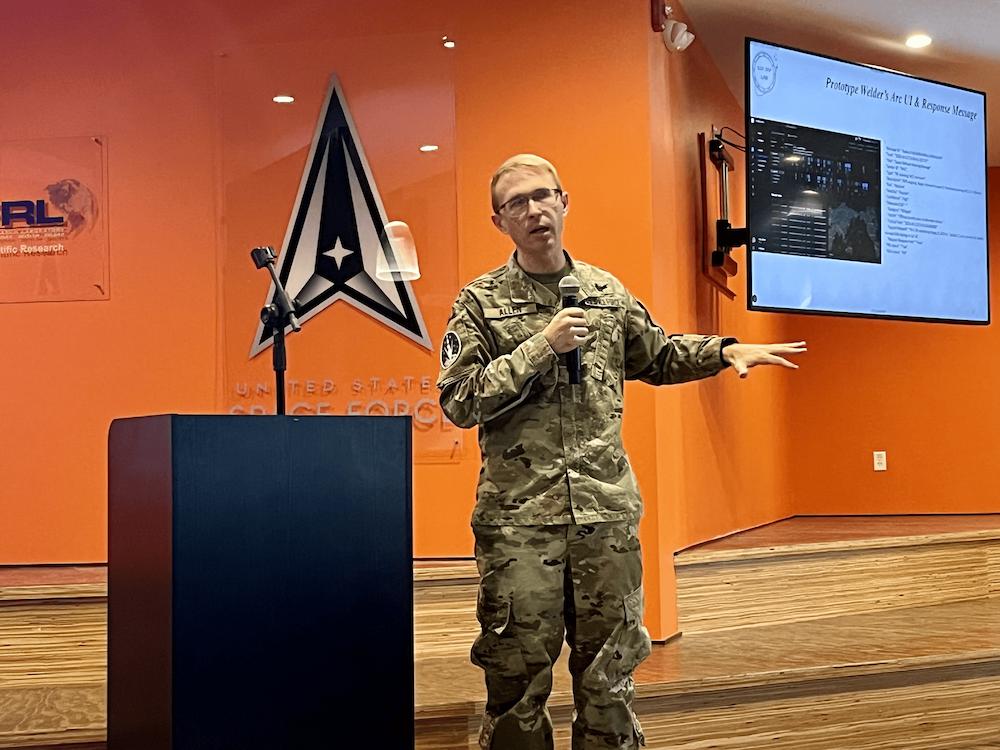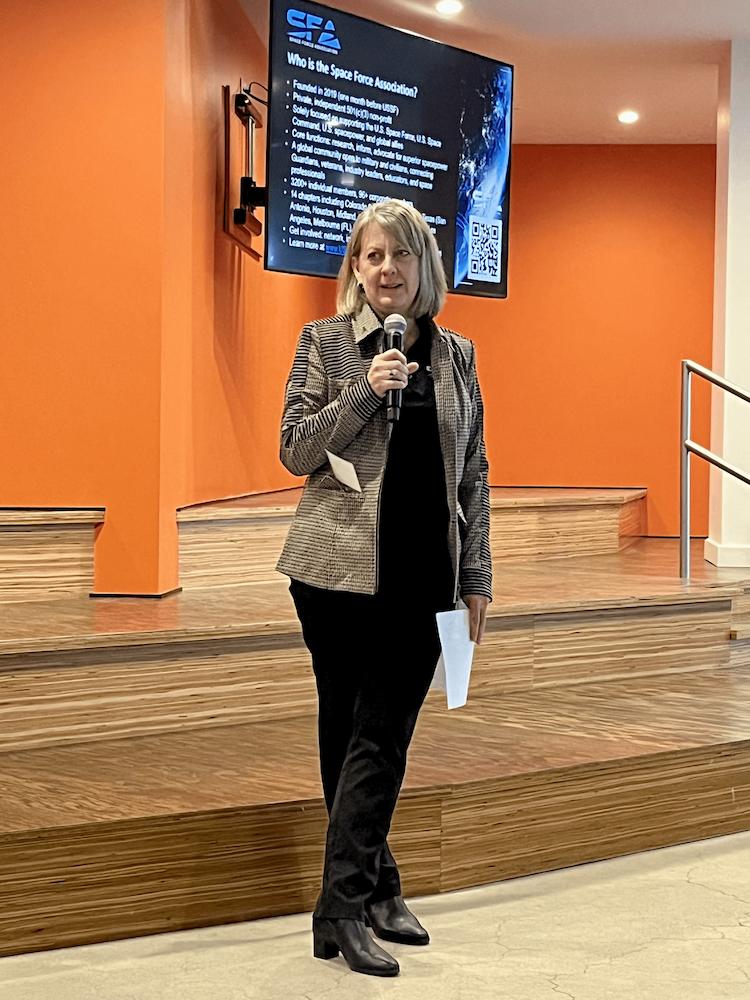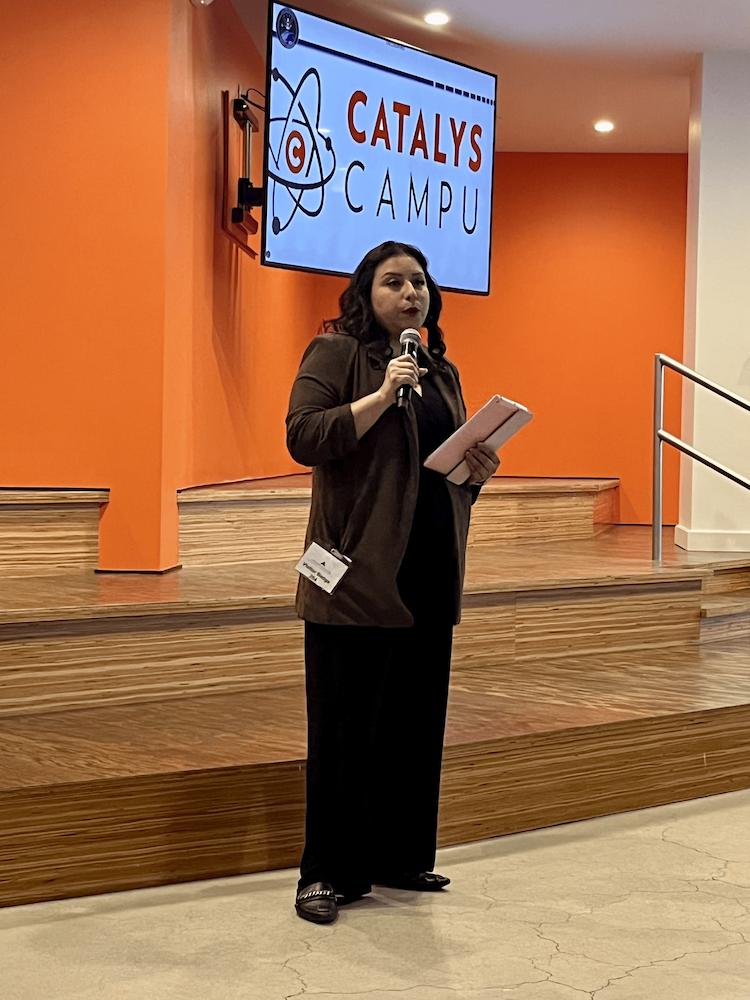Nestled at the foot of the Rocky Mountains, Colorado Springs, Colorado has emerged as a national epicenter for space domain awareness (SDA) research and development (R&D), where public-private partnerships, academic innovation and military leadership converge to secure the future of space operations.
A collaborative partnership and physical work space forms the heart of this momentum: the Innovation Hub. An alliance between the Virginia Tech Applied Research Corporation (VT-ARC) Innovation Hub, Space Systems Command’s (SSC) SDA TAP (Tools, Applications, and Processing) Lab and The Air Force Office of Scientific Research (AFOSR – part of the The Air Force Research Lab), this innovative group accelerates solutions for the most pressing challenges in space security. At a recent Demo Day for the TAP Lab’s Cohort 6, members, partners and affiliates provided updates on their progress relating to SDA.
A New Era of Collaboration: Virginia Tech’s Innovation Hub
The VT-ARC established its first out-of-state Innovation Hub in Colorado Springs in October 2023 to foster collaboration between academia, government and industry. This facility, alongside the SDA TAP Lab, offers much more than office space. It’s a vibrant, unclassified environment where international partners, students and non-cleared personnel can work side-by-side with defense professionals.

The Innovation Hub provides resources ranging from business intelligence and research analysts to data scientists and event coordinators. It aims to ensure that every visitor leaves with knowledge or connections they couldn’t have found elsewhere. This model not only accelerates technological advancement, but also democratizes access to the space sector’s most critical conversations.
The SDA TAP Lab: Accelerating Space Security Solutions
The SDA TAP Lab serves as the operational engine of the Innovation Hub. Its mission: to accelerate the delivery of data management and operational solutions for defense centers, focusing on five critical “kill chains” that underpin the defense of space assets from threats like anti-satellite weapons and hostile maneuvers.
Guided by leadership from SSC and the Space Force, the lab decomposes complex operational challenges into actionable problem statements. According to the SDA TAP Lab’s Chief, Major Sean Allen, cohorts tackle these problems in three-month engineering cycles by inviting industry and academic partners to co-develop and rapidly prototype solutions. Cohort 6 applied this systematic and rigorous approach to prioritize the avoidance of operational surprise by providing the tech and know-how for constant interrogation of targets for evidence of camouflage, concealment and deception.
Welders Arc: The Prototyping Powerhouse
A standout achievement from the SDA TAP Lab is the “Welders Arc” project. Allen described it as a fully modular, multi-vendor warning system. Welders Arc integrates commercial and government technologies into a cohesive, automated platform capable of detecting, tracking and responding to a range of space events such as launches, maneuvers, proximity operations and more.
The system’s architecture is built on a robust messaging infrastructure which supports over 100 message schemas to process and orchestrate responses to seven core event types. This enables real-time workflows for everything from launch detection (using seismic and infrasound data) to predictive orbit generation and sensor tasking, all the way through to defensive action recommendations. Welders Arc exemplifies the lab’s philosophy: break down big problems, prototype rapidly and integrate for operational effectiveness.
Cutting-Edge Demonstrations: Cuing and Automated Sensor Networks

Senior Principal Software Engineer Alex Vlasse at Cloudstone Innovations showcased the Lab’s prowess in automated sensor orchestration with a deep dive into “tipping and cuing” between command-and-control systems (C2) and a global network of sensors. By leveraging a unified data library (UDL) and standardized messaging, the TAP Lab has enabled the facilitation of seamless, automated collect requests and responses across international commercial and government sensors.
This approach allows for rapid, scalable coordination. Tens of thousands of collect requests are issued daily, enabling real-time tracking, custody maintenance and characterization of space objects. The system is optimized for speed and flexibility, with the ability to iterate and integrate new sensors and algorithms on the fly. Both Allen and Vlasse emphasized that the challenge is no longer about basic capability, but about optimizing performance and expanding sensor participation worldwide.
Educational and Internship Opportunities: Building the Next Generation
The Innovation Hub and SDA TAP Lab don’t only build solutions, they also help grow the workforce needed to enact them. According to Melissa Mills, together, they have engaged 28 students in active research, with 39 universities participating since the lab’s inception. Students tackle real-world problem statements, mirroring the work of industry partners. Both the Defense Innovation Unit (DIU) and Air Force Research Laboratory support these internships.
The lab also hosts the i5 student organization, an ROTC-driven team with over 1,000 members across 67 squadrons nationwide. It fosters hands-on experience in rocketry and space operations. These programs not only inspire future leaders but also embed them within the Colorado Springs ecosystem of innovation. This helps to ensure a steady pipeline of talent for the space domain awareness mission.
Catalyst Campus and the Power of Mini Accelerators
Catalyst Campus, another cornerstone of the Colorado Springs R&D scene, offers a unique blend of secure collaboration spaces, innovation services and accelerator programs. Its SDA-focused mini accelerator provides an eight-week, hybrid curriculum that prepares small businesses for integration into the TAP Lab’s projects. The program covers everything from business development and federal contracting to technical onboarding and strategic networking. It aims to mold participants into mission-ready and operationally aligned partners.
Catalyst Campus has already connected thousands of accelerator participants with jobs and injected millions into the local economy, demonstrating the tangible impact of its coalition-building approach. The accelerator’s focus on mission alignment and cross-sector collaboration makes it a key partner in the broader SDA effort.
A Network of Partners: Space Systems Command, Space Force Association, and Beyond

Speaking of partnerships, the Colorado Springs SDA ecosystem thrives on it. SSC provides operational leadership and technical guidance, while the Space Force Association offers networking, advocacy, and professional development opportunities for individuals and organizations across the country. Together with Virginia Tech, Catalyst Campus,and a host of commercial and academic partners, these organizations have formed a coalition that is truly at the tip of the spear in space security innovation.
The Next Frontier: Maui and the Expansion of R&D
Looking ahead, the SDA TAP Lab model plans to expand to Maui to leverage the region’s world-class space situational awareness capabilities and unique geographic advantages of the area. The new facility, set to mirror the collaborative spirit and operational focus of the Colorado Springs hub, will deepen the feedback loop between defense stakeholders, local companies and the broader innovation ecosystem. This expansion marks another milestone in building a resilient, nationwide network for SDA.
A Space for the Space Community
Colorado Springs stands out as a beacon of innovation in SDA. Virginia Tech’s Innovation Hub and the SDA TAP Lab, in concert with military, industry and academic partners continue to accelerate the delivery of operational solutions. From the modular power of Welder’s Arc to the global reach of automated sensor networks and from hands-on student engagement to the next frontier in Maui, this Colorado Spring ecosystem continues to define the future of space security – one prototype, one partnership and one student at a time.

